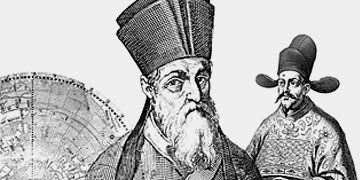The four pillars of our formation
The Ignatian vision of the world does not leave room for mediocrity. Our motto, Ad maiorem Dei gloriam, meaning ‘For the greater glory of God’ captures the essence of our spirituality. Our way of doing things is coloured by the term ‘magis’, which means ‘always more’, a term which continually reminds us that we can always take one more step, or do one more thing, or do something even better, because whatever we do is an ever-more explicit manifestation of the glory of God. The fundamental tool used throughout our formation is that of the discernment of spirits, which helps us learn to recognise the good in every situation and choose whichever way will lead to the greater good.
Dimensions
The spiritual exercises
The Spiritual Exercises were formulated as a result of the deep spiritual sensitivity of our founder St Ignatius Loyola, and inspired by the Holy Spirit. They are the source of our relationship with God, the world and ourselves. Each year we set aside some time away from our ordinary lives to look intently at the reality around us through the eyes of Christ, feeling with Him. The Spiritual Exercises offer a structured and personalised itinerary which invites us to re-order our lives and rediscover what it is that motivates our every action: a living relationship with the Risen Lord.
Daily Meditation
Our daily prayer consists of personal meditation on the Word of God. It is a time when we take a look at everything that makes up our day, our commitments, relationships and realities, and place them all before God, allowing Him to strike a chord in our hearts. Ignatian prayer requires patience. Our conscience is constantly called upon to distinguish between the various ‘spiritual movements’ that influence our behaviour, and to recognise which of these come from the Holy Spirit. In this way, we constantly fine tune the art of discernment.
The Examen (examination of conscience)
This does not simply consist in reviewing the day and identifying the good or bad things we may have done. Through the Examen we look at our lives through the loving eyes of God. In this way, we becomes more aware of the consolations and desolations that we have experienced: moments where our liberty has increased or deteriorated. Surrounded by the love of the Father, everything that makes up our life comes together in heartfelt thanksgiving or request for pardon.
Friendship among ourselves
Participating in a common mission offers us the possibility to learn to love and trust each other. During our formative years, ample time and space is offered to us to invest in ‘wasting time’ together! These conditions allow us to cultivate strong and stable bonds among us, where we can share about our experiences, feelings, daily and interior lives in a comfortable and informal way. This shared understanding becomes evident when we work together.
Collaboration
Collaboration with non-Jesuits is a constant reminder that our identity as religious can only take on its real meaning in the context of mutually enriching relationships. Through collaboration with others, through respectful dialogue and shared reflection, and through working together with others who are similarly committed although with different vocations, we learn more about our journey and how to move onwards with renewed enthusiasm and insight.
Meditation
Following Jesus’ example, we act as mediators particularly in areas of injustice and suffering. We prefer to apply our missions to the frontiers, places and situations where the need for reconciliation is the greatest.
Our every action is aimed at building bridges of peace, which requires a deep understanding of this world and God’s reconciliatory action in it.
During our formation, particular attention is given to learning how to listen openly and warmly, to create a space where the other may feel comfortable to freely express his or her needs, frustrations and hurts.
Appreciating the good
We presuppose that the way human beings choose to live is an expression, conscious or otherwise, of one’s being a child of God. This demands that each person be treated with the deepest respect, so that we may discover the ways in which the Holy Spirit manifests within him or her. We patiently study the contexts in which we live, rather than demonising or passing judgement, in order to discover which roads lead to the Father.
Exploring new possibilities
Ever since the very beginning, the intellectual dimension of our ministry was considered essential. During our formation we learn to reflect deeply and sistematically on the human condition in the light of the Gospel. This helps us to identify the deepest spiritual, psychological, socio-economic and political motivations that move people today, and then to develop new and relevant proposals that will integrate faith and justice at every level.
Using new language
We continually seek new ways to make our faith relevant in this ever-changing world. This could also mean adopting new ‘language’ and perspectives, continuously challenging our convictions, keeping them alive and vibrant. We learn to avoid abstract conceptual thought, and focus on being realistic and concrete.
Living a paradox
Our Ignatian way of doing things does not let us avoid paradoxes and contradictions, but rather invites us to embrace them. The Gospel itself is full of paradoxes, the greatest of which is that of the cross: a symbol of death that transforms into a symbol of salvation. Man’s heart is swarming in paradoxes, and mastery of this leads to great wisdom and creativity. We are constantly asked: To be or to do? Contemplation or action? Stand by Christ or be a person of this world?
Celebrate failures
Experiencing failure is never pleasant, especially after having worked hard at something. Sometimes, welcoming failure results in allowing us to question ourselves, come in touch with our most fragile humanity, and with humility let go to embrace God’s offer of salvation. Failure peels away our own certainties and all that is unnecessary. On an apostolic level, it helps us to empathise with those who fail daily, who each day experience delusion, frustration and injustice. It teaches us to respect and care for the wounded, rather than running away.
Facing the opposition
Facing opposition (certainly of our enemies but most especially of our friends and sometimes our superiors) in a constructive way is a great way to grow in consistency and faithfulness to our mission. Learning to ask for, give and receive feedback while working with others improves the way we act and interact. In the Spiritual Exercises St Ignatius invites us to praise others, and to avoid judging them, while truly trying to understand what it is that they would like to communicate.
The stages in our formation
This is the first step for those welcomed into the society. The novice is initiated in our way of life, our way of prayer, our way of looking at ourselves and at the world. He goes through a series of strong experiences, called experiments, and is invited to review each after having experienced it. He gradually learns to see how the Lord intervenes in his personal story, through situations and relationships that stimulate his qualities and test his limitations.
The first experiment is the month of spiritual exercises: the very core of our spirituality. The novice experiences directly how the Lord manifests himself in each one’s humanity, laced with good qualities and weaknesses, with powers and limitations. He learns a spiritual vocabulary that will help him read each situation in the light of this fundamental experience.
The other “experiments” are characterised by difficult situations of discomfort, where one learns how to welcome the presence of the Lord even in the most extreme difficulty.
The novitiate lasts two years and is situated in Genoa. At the end of this period, the novice takes his first vows of obedience, poverty, and chastity, thus declaring his desire to become part of the Society of Jesus.
Studying is considered one of the first forms of mission to which one is sent. During this time the Jesuit learns how to develop his own method of studying, by deepening the topics more suited to his intellectual orientation, to find a healthy balance between community life, apostolate work, prayer, and study. He starts to experiment with the first forms of collaboration, within the Society and outside of it. This stage lasts two or three years, including a good grounding in philosophy, and takes place in Rome, in the Università Gregoriana.
During this stage in his formation, each Jesuit is sent to live and work in an active apostolic community. Becoming immersed in the daily rhythm of our lives, working side by side with our elders, helps his spiritual growth and development as a person. Accompanied along the way, the Jesuit doing his Regency prepares himself for the reality that awaits him, confronting his idealism and coming in touch with his true qualities and his limits. During this time his level of maturity emerges more clearly, as he learns more and more to take on small responsibilities. This period lasts one to three years, depending on the circumstances. It takes place in any part of the Province of Italy, Malta or Albania.
Here the Jesuit focusses on his preparation for priesthood. It is the moment when he revisits his own religious experience in order to verify his own personal balance, his sense of belonging to the Society, and his understanding and ownership of the mission of the Church. The study of theology is not simply an assimilation of information about God, but it offers an expanding and deepening of various realities experienced in the earlier phases of his formation. The study of theology usually lasts three years, and can take place in Rome as well as in other international institutes: Madrid, Paris or London. The scope of studying abroad is that of broadening one’s horizons and adapting to different ways of life.
The degree completes the study of theology. The Jesuit is ordained a priest and joins an active community. In this context, working with fellow Jesuits and lay people, he furthers his studies, specialising in the mission he has been entrusted and sent to serve. Together with the degree, there are also other special studies he may follow (doctorates and other degrees and courses) according to the type of mission he has been sent to. Today this requires a tenacity and perseverance in applying oneself to the work assigned, a finely attuned process of discernment to examine reality through our spiritual lens, and an intelligent, creative flair to communicate one’s thoughts to others. The degree can more often than not be pursued abroad.
This is the last step in the basic formation of a Jesuit. It is the culmination of the journey taken so far, in all its dimensions (spiritual, intellectual, affective and experiential) with a view to the definitive joining of the Society by taking the final vows. It is the moment of reaffirmation of belonging to the Society, revisiting the fundamental experiences that have touched his heart: It includes a month of Spiritual Exercises, contact with the poor, deepening of his understanding of the Constitutions and an experience of living in an international community. This step is done abroad.
Our formation continues throughout our lifetime. After the basic formation, a Jesuit is sufficiently mature to assume responsibility for his own formation, based on the mission he has been entrusted with. The Society continues to provide tools and opportunities in order to remain in touch with today’s realities. The friendships built amongst ourselves and the constant sharing with each other facilitate the exchange of insights, knowledge and resources, which become the Society’s common legacy.



